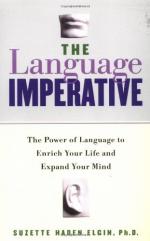|
This section contains 1,660 words (approx. 6 pages at 300 words per page) |

|
What is a "language"? Is it an internal component of a speaker's mind, or is it wholly dependent on our external behavior? Is it a matter of social practice, or are languages to be viewed as independently existing abstract objects? Arguments have been offered in favor of each of these conceptions.
Adherents to these different positions can agree that linguistic theories provide the most precise way of characterizing particular languages. A theory, or grammar, supplies a set of rules describing the semantic properties of the basic expressions and their permissible syntactic combinations into meaningful wholes. The disagreements that arise concern the interpretation of linguistic theories and the nature of the linguistic objects and properties they describe.
Platonists, for instance, argue that languages are purely formal, or abstract entities, whose natures are fully specified by formal theories. For the Platonist, linguistics is a branch of mathematics. In contrast, mentalists...
|
This section contains 1,660 words (approx. 6 pages at 300 words per page) |

|


